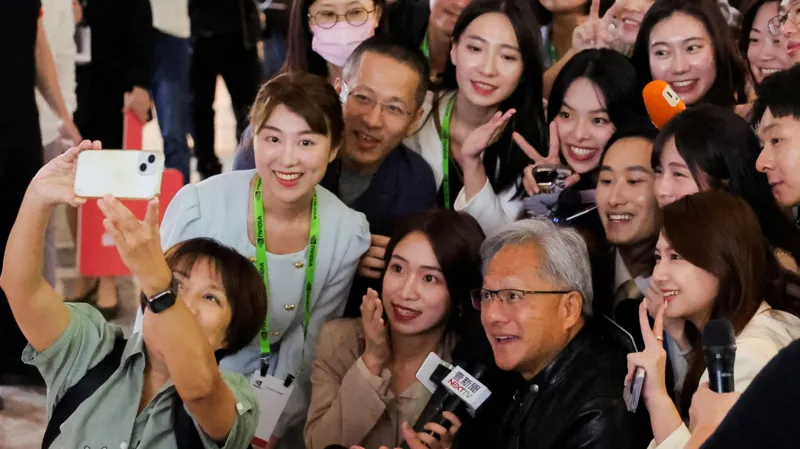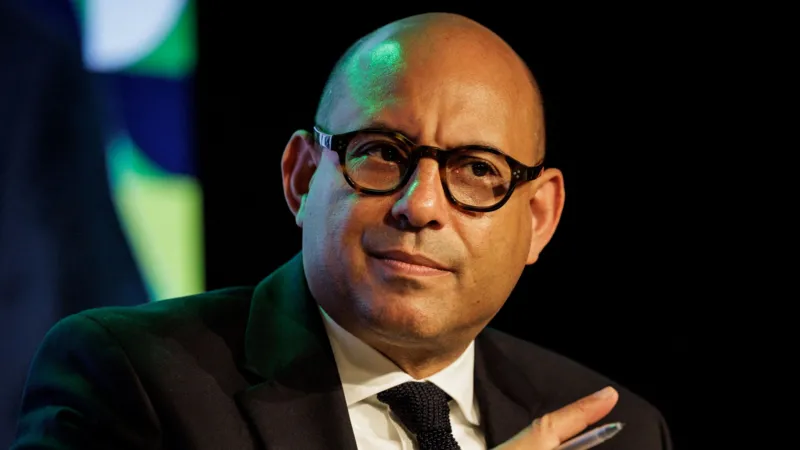Why is Nvidia boss the 'Taylor Swift of tech'?
These days, wherever Jensen Huang goes, crowds chant his name and scramble for selfies and autographs.

He is not your usual celebrity - rather, the 61-year-old electrical engineer is the chief executive of Nvidia, the chip powerhouse whose value just surged past $3tn (£2.3tn), briefly overtaking Apple as the world's second-most valuable company, before pulling back.
“He is literally being treated like a rock star,” says technology analyst Bob O’Donnell. “Jensen sees this opportunity to build on Nvidia. He’s obviously enjoying the moment."
His new-found status, complete with an embossed $9,000 Tom Ford biker jacket, was on display this week at Computex in Taiwan - the annual tech conference draws the world's biggest companies to the island.
Mr Huang, who was born in Taiwan but left when he was just five years old, posed for countless pictures and even scrawled his name on a woman's top at the conference, wondering aloud if this was a "good idea". It was, in the words of local media, pure "Jensanity".
This comes as US regulators are reportedly planning to open an investigation into big tech, including Nvidia, over its dominance over the AI industry.
The interest Mr Huang has stirred has not been lost on his peers - Meta CEO Mark Zuckerberg, responding to a social media follower who did not know who Mr Huang was, described him as “Taylor Swift, but for tech”.
What is driving the 'Jensanity'?
Mr Huang is at the forefront of a technology boom, and his rise has coincided with Nvidia's emergence as the leading designer of AI chips.
Taiwanese chipmaking giant TSMC is the sole production partner for Nvidia’s cutting-edge AI chips. And Nvidia's success has been a boost for TSMC, whose shares hit a record high on Thursday.
High-end chips, including those used for AI, have become a source of geopolitcial tension as the US and China race to master production. But it's Taiwan that currently sits at the top of that game - it makes nearly all of the world's most advanced chips.
All of this has generated a lot of buzz around Mr Huang and the company he founded decades ago. His success is also a matter of pride for Taiwan, a self-ruled island which Beijing claims.
As those claims have become more aggressive, Taiwan's chip exports have both become a lifeline and a tool of soft power.
"In Taiwan, he’s also the local boy done good. That is something people can rally around," Mr O'Donnell said.
Although he lives in Santa Clara in California where Nvidia is headquartered, Mr Huang frequently visits Taiwan. He has always emphasised that Nvidia would continue investing in the island.
Just this week, he told reporters that the company plans to build regional headquarters in Taiwan, which is welcome news for the island. It has been concerned about chip production moving overseas as manufacturers look for alternative supply routes that would be safe in case of a Chinese invasion.
And of course, there is the success of Nvidia itself. Shares have gone up by more than 200% over the last year.
The secret sauce for Taiwan's chip superstardom
The firm has been catapulted into tech stardom as AI and the chips that power it become as cool as any fancy new gadget.
Mr Huang knows this well. He has been fronting Nvidia's chip launches and they have been likened to massively-watched Apple events.
In Taiwan, where he launched new products, he spoke for two hours about the company's history.
“Nvidia’s last big conference in San Jose was in a stadium. It was jam-packed and huge lines of people couldn’t get in. It was like a rock concert,” Mr O’Donnell said.
“This time, he spoke in a sports stadium in Taiwan. I joked that he was on his arena tour.”
What do we know about Jensen Huang?
For one, Mr Huang loves his leather jackets. He credits his wife and daughter for making it his signature style.
A spokesperson from Nvidia says he been wearing one for more than two decades now. His latest pick from Tom Ford is from the fashion house's 2023 season - and he has kept it on even during visits to humid Singapore.
“Leather jackets can signal an edge: a willingness to break rules, do things differently and challenge the status quo,” says fashion stylist Sera Murphy.
“Jensen’s signature style gives him a casual, approachable energy,” she adds.
Signature styles are not uncommon among tech CEOs. Apple co-founder Steve Jobs was known for the outfit he wore all the time - black St. Croix mock turtleneck sweater, blue Levi's 501 jeans, and New Balance 991 trainers. Mr Zuckerberg is usually in plain sweaters and t-shirts from luxury fashion brands.
“Uniform dressing” can help entrepreneurs create an image of stability around their companies, Ms Murphy says.
“People need consistency from leaders. Dressing in a uniform makes things predictable in a market that is volatile and unpredictable."
His leather jacket aside, Mr Huang fits the description of a tech geek.
He was nine years old when his family moved to the West Coast in the US. He graduated as an electrical engineer from Oregon State University, and then with a masters degree in the same field from Stanford University.
He married his college sweetheart and lab partner, Lori Mills, also an electrical engineer. The couple have two children.
He worked at US chip firm AMD before co-founding Nvidia in 1993. The company was originally known for chips that process graphics, particularly for computer games. Eventually it changed focus to AI, a field it now dominates.
Interest in AI skyrocketed after the 2022 launch of ChatGPT. The chatbot was trained using 10,000 of Nvidia's graphics processing units (GPUs), clustered together in a supercomputer.
This propelled Nvidia to the elite club of US companies worth at least $1tn last May, joining the likes of Apple, Amazon, Alphabet and Microsoft.
Nvidia is now the world's third-most valuable company, after Microsoft and Apple.
Mr Huang himself has a net worth of around $106bn, according to Forbes, making him the 14th richest person in the world. Mr O’Donnell says Mr Huang is likely to keep appearing at events, seeking to drum up Nvidia's brand.
“At technology conferences, everyone wants Jensen on stage and he’s happy to join. What he has done makes him appear everywhere. He’s positioned himself as the figurehead of generative AI,” Mr O’Donnell says.
“The issue is the industry does not like monopolies. Nvidia has a huge market share, but competitors like AMD and Intel are starting to catch up."
-bbc







